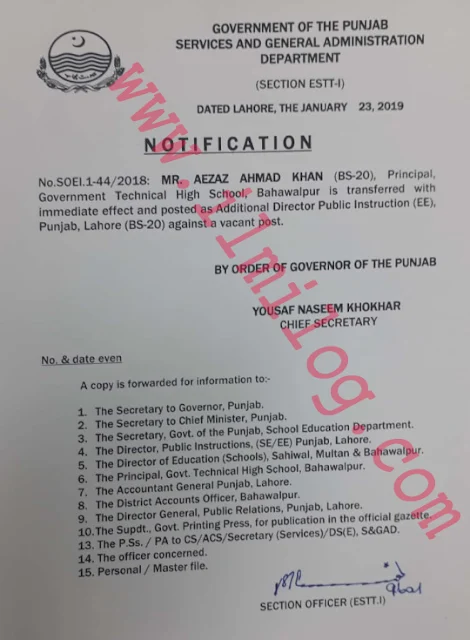Education Posts Transfer as a Director Public Instruction (EE) Punjab
Introduction
In the realm of education, effective leadership plays a crucial role in shaping the educational landscape and ensuring the smooth functioning of educational institutions. One significant responsibility held by education administrators is the transfer of education posts. Among them, the Director of Public Instruction holds a pivotal position in overseeing and facilitating the transfer process. In this article, we will explore the role of a Director of Public Instruction in managing education posts transfer and its impact on the overall educational system.
NOTIFICATION No.SOE1.1-44/2018 dated LAHORE, January 23, 2019, regarding Transfer posting Against a Vacant Post by the government of the Punjab Services and general administration department.
MR. AZIZ AHMAD KHAN (BS-20). Principal. Government Technical High School, Bahawalpur is transferred with immediate effect and posted as Additional Director of Public Instruction (EE), Punjab, and Lahore (BS-20) against a vacant post.
BY ORDER OF THE GOVERNOR OF THE PUNJAB
YOUSAF NASEEM KHOKHAR CHIEF SECRETARY
Forwarded for the info to:-
1. The Secretary to Governor. Punjab. 2. The Secretary to Chief Minister, Punjab. 3. The Secretary, Govt. of the Punjab, School Education Department. 4. The Director, Public Instructions, (SE/EE) Punjab. Lahore. 5. The Director of Education (Schools), Sahiwal, Multan & Bahawalpur. 6. The Principal, Govt. Technical High School, Bahawalpur. 7. The Accountant General Punjab, Lahore. 8. The District Accounts Officer. Bahawalpur. 9. The Director-General. Public Relations, Punjab. Lahore. 10. The Spud. Govt. Printing Press, for publication in the official gazette 13. The P.Ss. / PA to CS/ACS/Secretary (Services)/DS (E), S&GAD. 14. The officer concerned. 15. Personal / Master file.
Understanding the Director of Public Instruction
The Director of Public Instruction, often referred to as the DPI is a key administrative position within a government’s education department. This individual is responsible for overseeing the entire education system, including the transfer and appointment of educational personnel. The DPI ensures that educational policies and regulations are effectively implemented across various educational institutions, with the ultimate goal of improving the quality of education.
The Role of the Director of Public Instruction in Education Posts Transfer
- Policy Development: The DPI plays a crucial role in developing policies and guidelines related to the transfer of education posts. They collaborate with other stakeholders, such as school boards, district administrators, and teachers’ unions, to establish a fair and transparent transfer process that takes into account the needs of both educators and students.
- Strategic Planning: The DPI engages in strategic planning to ensure the equitable distribution of educators across different schools and districts. They analyze factors such as student enrollment, teacher-to-student ratios, and the availability of resources to determine the optimal allocation of teachers and other educational personnel. By strategically transferring education posts, the DPI can address staffing imbalances and enhance the overall quality of education delivery.
- Human Resource Management: The DPI oversees the management of human resources in the education sector. This includes identifying qualified candidates for vacant positions, conducting interviews and assessments, and making informed decisions regarding transfers. The DPI ensures that teachers and staff members are assigned to appropriate positions based on their qualifications, expertise, and the needs of the educational institutions.
- Communication and Collaboration: The DPI serves as a liaison between various stakeholders involved in the transfer process. They facilitate effective communication and collaboration between school administrators, district officials, and educators to ensure a smooth and efficient transfer process. Additionally, the DPI addresses any concerns or grievances raised by teachers or other personnel during the transfer process, striving to maintain a supportive and inclusive work environment.
Benefits and Impact of Education Posts Transfer
The transfer of education posts, when managed effectively, can yield several benefits and positively impact the educational system:
- Enhanced Teacher Quality: By strategically transferring teachers, the DPI can match their skills and expertise with the specific needs of schools and districts. This ensures that students receive high-quality education from competent and experienced educators.
- Professional Growth Opportunities: Education posts transfer provides teachers and staff members with opportunities for professional growth and development. Transfers to different schools or districts expose educators to diverse educational environments and teaching methodologies, fostering their personal and professional growth.
- Balanced Resource Allocation: The transfer process enables the DPI to distribute educational resources and personnel equitably across various institutions. This ensures that schools in underserved areas receive adequate staffing and resources, reducing educational disparities.
- Enhanced Collaboration and Knowledge Sharing: Transfers promote collaboration among educators from different backgrounds and experiences. It encourages the exchange of ideas, best practices, and innovative teaching methods, fostering a culture of continuous learning and improvement.
Conclusion
The role of a Director of Public Instruction in managing education posts transfer is crucial for the efficient functioning and development of the educational system. Through policy development, strategic planning, and effective human resource management, the DPI ensures that education posts are transferred in a fair and transparent manner. This process enhances the quality of education, promotes professional growth, and facilitates the equitable distribution of resources. By recognizing the significance of education posts transfer and supporting the role of the DPI, societies can strive towards building a stronger and more inclusive educational system.


.png)